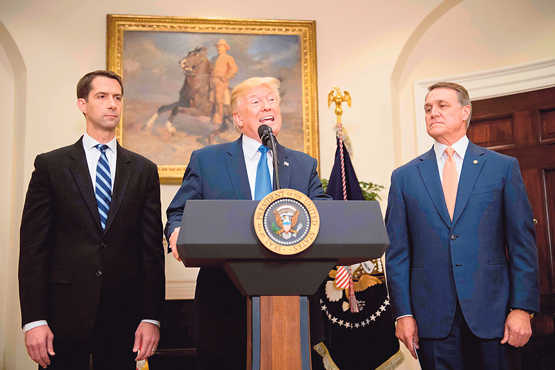
Proposed law will scrap lottery system to come to US; Professionals from India to benefit
WASHINGTON (TIP): US President Donald Trump, on August 2, endorsed a legislation that would drastically cut the number of legal immigrants allowed into the country and implement “merit-based” visa scheme which could benefit highly-educated and technology professionals from countries like India.
The Reforming American Immigration for Strong Employment (RAISE) Act would scrap the current lottery system to get into the US and instead institute a points-based system for earning a Green Card. Factors that would be taken into account include English language skills, education, high-paying job offers and age.
If passed by the Congress and signed into law, the legislation could benefit highly-educated people and technology professionals from countries like India.
“The RAISE Act will reduce poverty, increase wages, and save taxpayers billions and billions of dollars. It will do this by changing the way the US issues Green Cards to nationals from other countries. Green Cards provide permanent residency, work authorization, and fast track to citizenship,” Trump said at a White House event to announce his support to the RAISE Act.
The Bill, Trump said, “would represent the most significant reform to our immigration system in half a century.”
Standing along with two top authors of the Bill-Senators Tom Cotton and David Perdue-Trump said the RAISE Act ends chain migration and replaces the low-skilled system with a new points-based system for receiving a Green Card.
This competitive application process will favor applicants who can speak English, financially support themselves and their families and demonstrate skills that will contribute to our economy, he said.
The RAISE Act prevents new migrants and new immigrants from collecting welfare and protects US workers from being displaced, he added.
“That’s a very big thing. They’re not going to come in and just immediately go and collect welfare. That doesn’t happen under the RAISE Act. They can’t do that. Crucially, the Green Card reforms in the RAISE Act will give American workers a pay raise by reducing unskilled immigration,” he said.
“It has not been fair to our people, to our citizens, to our workers,” Trump said of the current immigration system.
Trump said this legislation will not only restore America’s competitive edge in the 21st century, but it will restore the sacred bonds of trust between America and its citizens.
“This legislation demonstrates our compassion for struggling American families who deserve an immigration system that puts their needs first and that puts America first,” he said. — PTI
What authors of the Bill Cotton and Perdue say
First, we bring over a million immigrants into this country a year. That’s like adding the population of Montana every single year; adding the population of Arkansas every three years. The vast majority of those workers come here not because of their job skills or educational attainment. — Tom Cotton, senator
We looked at countries like Canada, Australia. What we’re introducing today is modelled on the current Canadian and Australian systems. It’s pro-worker, it’s pro-growth, and it’s been proven to work. Both have been extremely successful in attracting highly skilled workers to those countries. — David Perdue, senator
RAISE Act against South Asians: SAALT
The RAISE Act would hit the South Asian community, a top American non-profit body has claimed. If passed by the Congress and signed into law, the legislation would significantly reduce the number of immigrants who can obtain green cards and other visas, South Asian Americans Leading Together (SAALT), a national South Asian civil rights organization said
The RAISE Act would eliminate preferences for extended family members similar to the ‘Muslim ban’, eliminate the diversity visa lottery, limit refugees offered permanent residency to 50,000 per year, and institute a ‘skills-based points’ merit system, SAALT said
Numbering over 4.3 million, the South Asians are the fastest growing demographic group in the US, with the majority of the communities foreign-born, SAALT said.





Be the first to comment